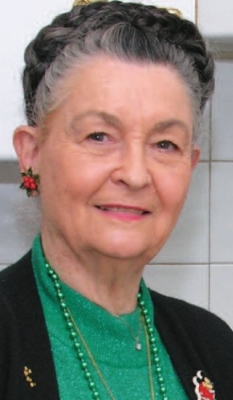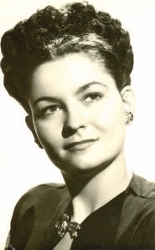Colleen Davis 1926-2015
Raanana's first civil burial was held recently after the passing of Colleen Davis, a resident of the city.. She was a Christian woman who made aliyah 20 years ago out of love for Israel. Her funeral marked the official inauguration of the civil cemetery following two years of planning.
After a long battle against cancer, Colleen Davis, a devout Christian and resident of Raanana, was the first to be buried in the town's new civil cemetery.
She was born in Indiana, USA. In high school she met her husband, Cecil (91), a much-decorated former US combat pilot who fought in WWII and in the Korean War. A year after meeting, the couple married secretly. They have two sons, David (65) and Don (59). "On our first date I knew I was going to marry her," Cecil recounted emotionally.
Colleen was a model in her youth and later worked in a wartime factory making parts for bombs. She and Cecil knew that one day they were going to move to Israel. "Our dream was to live in the Promised Land," said Cecil. "Colleen once suggested that we visit Israel. I replied that 'if I ever go to Israel it will be to live there'."
In March 1995 the couple realized their dream and, as Christians, made aliyah to Raanana. "We felt that this is where we should be. I suppose you could call us 'Zionists' because we believe that we should be living in Israel. Regardless of what happens here, we feel safe. This is God's land."
Colleen did a lot of work for the community. "Among other things, she volunteered at the American School, but the project closest to her heart was packing and distributing food to those in need," said younger son, Don.
She was also very hospitable and her home was always open. "Mom made sure that everyone felt welcome. When she saw someone in need, she always had a helping hand," Don said.
Colleen would write letters to her Christian friends advocating Israel's case. "If any article published in the media aggravated her, she would write her friends, giving them her opinion," Cecil commented.
Cecil and Colleen quickly became well known in Raanana. "Everyone knew them but not everyone knew they were not Jewish," Don remarked.
Five years ago Colleen was diagnosed with cancer. She refused chemotherapy and radiation treatments, opting for quality of life. After three years, the cancer had spread throughout her body. She passed away a month before her 89th birthday, and before she and Cecil could celebrate 71 years of marriage.
"We were direct opposites," Cecil noted. "Colleen was gregarious whereas I am not. I enjoy being alone or with just the family. However, we respected each other. We shared many experiences in our lives. During all our treks around the world we lived in trailers, in steamy jungles and in cabins. We traveled with family, friends and even people we had never met before. We saw dangerous countries, third-world countries, as well as modern countries. She never complained."
Before Colleen died, Don began searching for a civil burial site. "Until after she died I had no idea where we were going to bury her. I was worried that we might be forced to bury her in the Negev or some other place far from home," he said. Whenthe Raanana Hevra Kadisha asked to meet, Don was a little disconcerted. "Dealing with religious bureaucracy has not always been easy. However, I was surprised by their respect and compassion. They said they would bury my mother even though the cemetery was not quite ready, and managed to get it ready enough in just a few hours," he added with a note of gratitude.
Meir Katzin, chairman of the Hevra Kadisha, added,:"I am pleased that we were able to allow the Davis family a funeral that was meaningful to them, even though it was very different from our usual procedure. Now, the family of the deceased can decide what kind of funeral they want. They can have a priest, a rabbi or anyone else. The funeral is carried out in accordance with the family's wishes. Any family that does not want a religious funeral will be able to bury their loved ones in the new civil section of the cemetery."
Translated from the Hebrew by Norman Silbert









Comments